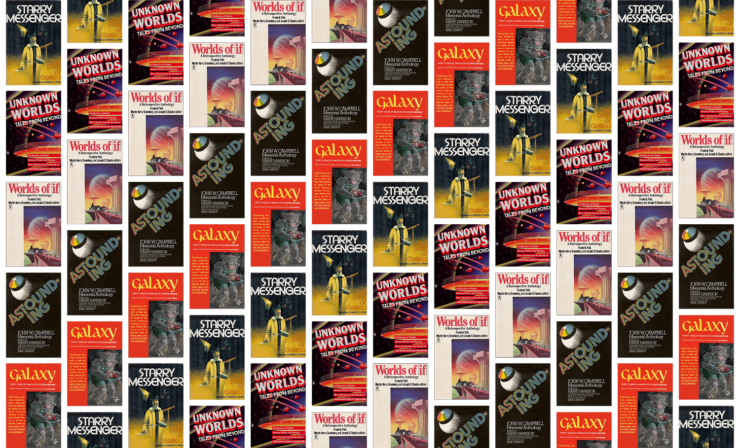It is possible to do your best and still fail. The history of the magazine trade is littered with the corpses of magazines unable to prevail against competition, hostile industry conditions, reader indifference, bad luck, or even the publisher’s disinclination to pay writers without being forced to so by a lawsuit.
However, fond memories linger long after economic reality has had its way. One expression of this nostalgia is the retrospective anthology, drawing modern readers’ attention to the wonders they could have had, had they been older or more willing to part with a quarter. Consider these five examples.
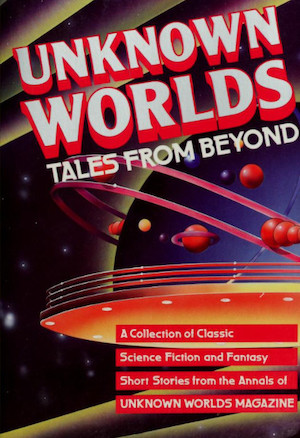
Unknown (also known as Unknown Worlds) was an attempt by editor John W. Campbell, Jr. to do for fantasy what Astounding had done for science fiction. While there was an audience for Unknown’s style of logically developed fantasy, Campbell made one small but fatal miscalculation, which was to launch Unknown in 1939. Wartime paper shortages killed the magazine in 1943.
Nevertheless, Unknown made enough of an impact in those five years that it has inspired a multitude of retrospective anthologies. I am aware of at least six.1 None are particularly recent but it’s not hard to track down copies of most. I’d recommend Stanley Schmidt and the relentlessly energetic Martin Greenberg’s Unknown Worlds: Tales from Beyond, as it is both longer and contains better stories than Schmidt’s other 1988 Unknown-themed anthology, Unknown.
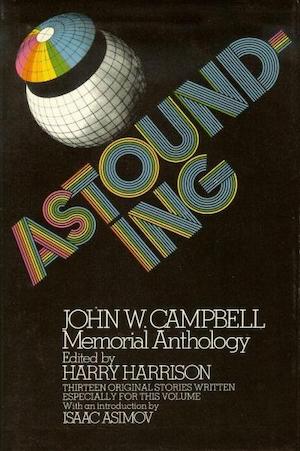
The next anthology memorializes not a magazine but its editor. Astounding still survives, renamed Analog. The same cannot be said of editor John W. Campbell, Jr., who died in 1971. Campbell was a figure who sparked considerable controversy in the field2 and was the champion of many ill-conceived causes. At the same time, one cannot deny he helped shape SF.
Under the editorship of Harry Harrison, 1973’s Astounding: John W. Campbell Memorial Anthology assembled an assortment of stories by Astounding regulars. Rather than offering classics from the pages of Astounding, the anthology contains what might best be described as stories Campbell might have bought, had he lived longer. A number of long-running series such as Simak’s City, Smith’s Venus Equilateral, Reynold’s Homer Crawford, and Harrison’s Deathworld have codas in this volume.
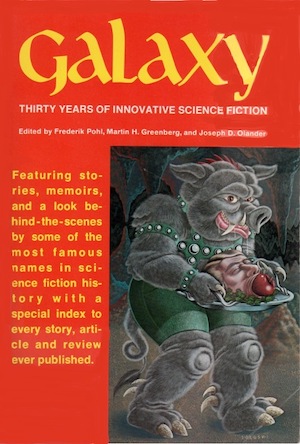
Galaxy Magazine was founded in 1950. Under H.L. Gold, it established itself as one of the three giants in the magazine SF field, alongside Astounding (later renamed Analog) and The Magazine of Fantasy and Science Fiction. Galaxy maintained its prominence through the 1960s, but despite a Jim Baen-piloted renaissance in the mid-1970s (something Baen managed despite a minuscule budget), the magazine folded in 1980. A mid-1990s revival failed.
Not to worry, as long as you have access to a well-stocked used book store. In 1980, editors Martin H. Greenberg, Joseph D. Olander, and Frederik Pohl assembled Galaxy: Thirty Years of Innovative Science Fiction. This nearly 500-page volume3 presented the best stories Galaxy had published, drawn from across the entirety of its history to date. Each story was accompanied by commentary written by each story’s author.
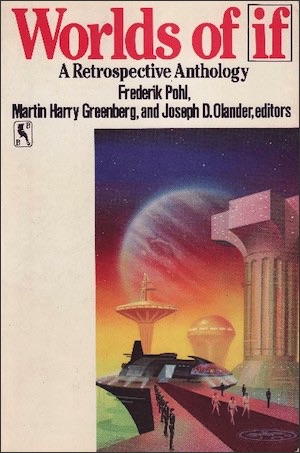
Founded in 1952, If survived the great catastrophe of 19574 and was ultimately sold to Galaxy Publishing. If became a sort of junior sibling to Galaxy. It was the magazine to which lesser known, and perhaps less polished, authors were consigned. One might therefore expect a second-rate magazine, but it was not so! Hugo-winner If published authors destined to be big names (like Larry Niven) and serialized such novels by established authors as The Moon is a Harsh Mistress. Not that any of that saved If from grim economic realities; If was merged with Galaxy in the 1970s and perished with that magazine.
Happily, editors Martin H. Greenberg, Joseph D. Olander, and Frederik Pohl were just as fond of If as they were of Galaxy. Their 1986 Worlds of If: A Retrospective Anthology offers 400-plus pages filled with the best of If. As with their Galaxy retrospective, stories are accompanied by commentary from each author.
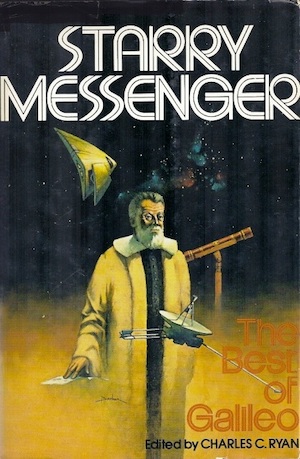
Galileo was founded by Charles C. Ryan in 1976. Despite a minuscule budget and bare-bones production values, Ryan methodically improved the magazine, and increased sales over the course of the next few years. Names now very familiar to SF readers, such as Connie Willis, Larry Niven, and Joe Haldeman, were featured. Unfortunately, Galileo was done in by aggressively user-hostile software and unexpectedly weak newsstand sales. The magazine folded in 1980.
Although 1979’s Ryan-edited Starry Messenger cannot have been intended as a memorial (since it predates Galileo’s demise), the comparative durability of anthologies allows Starry Messenger to serve as such. Within the almost 200 pages, you will find an assortment of stories by luminaries such as Ellison, Aldis, Willis, and Foster. All you need do is track down a copy.
***
Usually this is where I would plead lack of room and admit that the list above is incomplete, for anyone who wants to offer suggestions and recommendations in the comments. However, while I am certainly curious which retrospectives I overlooked, I am more curious about the retrospectives that never were: What extinct magazines or editors deserve their own memorial anthologies?
In the words of fanfiction author Musty181, four-time Hugo finalist, prolific book reviewer, and perennial Darwin Award nominee James Davis Nicoll “looks like a default mii with glasses.” His work has appeared in Interzone, Publishers Weekly and Romantic Times as well as on his own websites, James Nicoll Reviews (where he is assisted by editor Karen Lofstrom and web person Adrienne L. Travis) and the 2021, 2022, and 2023 Aurora Award finalist Young People Read Old SFF (where he is assisted by web person Adrienne L. Travis). His Patreon can be found here.
[1]1948’s 'From Unknown Worlds,' edited by John W. Campbell, Jr.; 1963’s 'The Unknown,' edited by D. R. Benson; 1963’s 'Hell Hath Fury,' edited by George Hay; 1964’s 'The Unknown Five,' edited by D. R. Benson; 1988’s 'Unknown,' edited by Stanley Schmidt; 1988’s 'Unknown Worlds: Tales from Beyond,' edited by Stanley Schmidt and Martin H. Greenberg.
[2]I cannot emphasize enough the degree to which this is an understatement, or the degree to which Campbell deserved the opprobrium hurled his way. For more details, see Alec Nevala-Lee’s 'Astounding: John W. Campbell, Isaac Asimov, Robert A. Heinlein, L. Ron Hubbard, and the Golden Age of Science Fiction.'
[3]Published courtesy of Playboy Press, perhaps better known for other publications.
[4]The liquidation of American News Company, which accounted for a huge percentage of magazine distribution. The End Permian-level extinction event that followed reduced the number of science fiction magazines by about three quarters.










